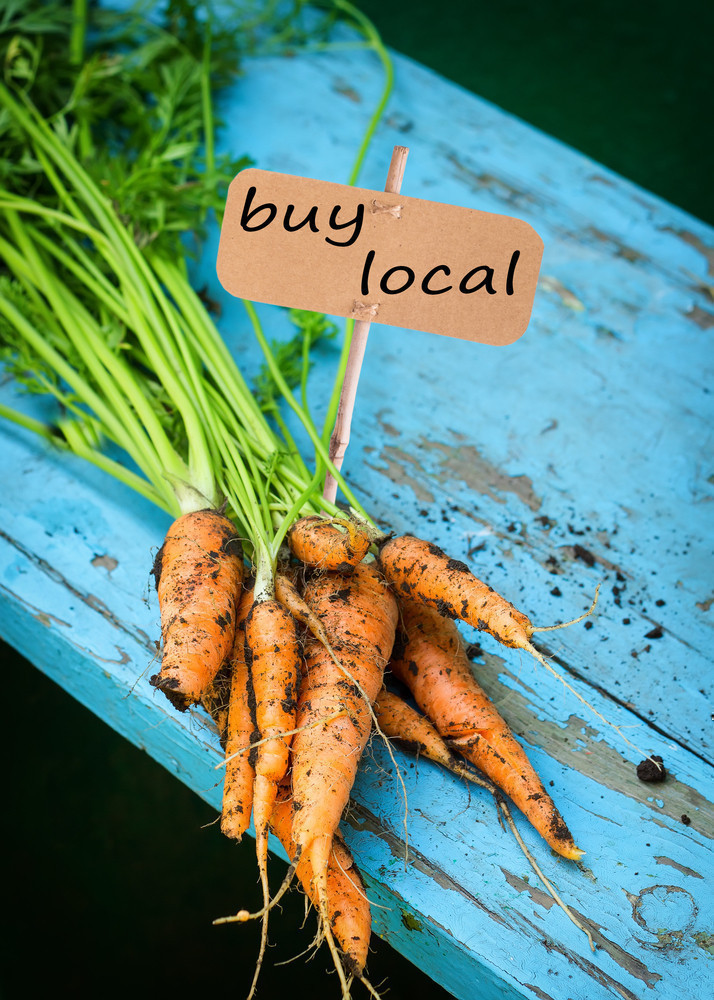
Open your mailbox on a Monday or Tuesday and it’s obvious that Supermarkets reign in the area of advertising. Drive down the freeway, turn on the radio and even the TV and you will see advertising in every corner — it’s a fact that supermarkets have a huge monopoly over the shopping public.
Monday mornings, grocers are pumping their Wednesday ads “Great Deals!” and “Super Low Prices!”.. filling your mind with the notion that you can’t miss this week’s sale ~ there are SO many GREAT deals on meat and produce that you will do your family an injustice if you skip out on buying.
It doesn’t always occur to people that it’s actually cheaper to buy your fresh produce somewhere else. Like somewhere local. A local farmer. Over the years here in Phoenix we have seen farmers cash in, their land sold, developed on… and it’s sad to drive through all these areas and see the smaller farmer struggle.
My parents worked in farming for years and still do, and it’s hard to find those farmers who are not willing to sell out to big industry. Farming is not much of a money making venture these days.
For the record, supermarkets aren’t where it’s at – hate to say it, but it’s possible to “not” buy groceries at the supermarket. Grow your own, join a CSA, buy your milk and meat from a local farm that you drive to… and you may realize that not only are you getting better food, you will save yourself a bundle too.
Though the perception is that unless you use coupons and shop at the grocery store you are not really saving. In fact, it couldn’t be more of a lie.
Supermarkets don’t offer the freshest produce – produce has traveled for a long time before hitting the shelf. It has been sweating during travel – it was sprayed with preservatives and chemicals to keep them fresh ON the trip. Buying local has it’s advantages – we outlined 10 here actually. Not only are you getting seasonal produce, it’s locally grown, without pesticides, , close to your home.Why does Supermarket Food Appear to Cost Less?
Appear is the trigger – it might appear to cost less, but it’s really not less at all in the end. The perception that it is less is not really a reflection of the truth.
Much of the grocery store food is discounted – paid for by government subsidies. Tax dollars taken out of your pay before you receive your pay discount the food even before it arrives at the supermarket. The cheap food is expensive – at least to some of us who buy local food instead.
While some may think that $3 is a great bargain for frozen pizza, I don’t think that could be farther from the truth. $3 could make us several pizzas, at home, from scratch – with a little effort. Cereal in a box? Not in our cabinet. Organic Steel Cut Oats might not be as appealing to kids, but it’s what OUR kids like to eat – sure, it takes a little longer to make (10 minutes) versus opening a box and pouring in a bowl.
Government policies give out huge advantages to big farms – corn and soybean operations are highly subsidized – crop insurance is subsidized. This cash flow for larger commercial farmers gives them the confidence they might be looking for to support their operation. In the end, they go to bed feeling secure in their choice – after all, billion dollar food companies have partnered with them giving them the reassurance of constant cash flow.
Differences in Food
To many, the hamburger in the supermarket might just be a hamburger ~ the apples, all the same… the chicken, that’s really incredibly cheap at the hispanic store might just be a bargain in your book.
But if you think that the $.47 per lb chicken likely from a confined feeding operation of thousands of chickens who live and breathe on top of eachother is NO different than that poultry from your local {organic} family farm that raises chickens on pasture.. then perhaps you should probably continue to keep putting your money where you already do – the grocery store.
But if you firmly believe there is a notable difference in the beef you get from your local farm directly (Organic, Pastured Beef), versus the ground beef squashed into a tube and throw in the meat case in your local store, then you will understand why some people have a different mentality towards their food and what they put in their body.
Buying Local versus The Supermarket
In the end, I am probably one of many who finds it incredibly impossible to even approach or address the subject.
Part of me wants to shout to the rooftop: YES – we ditched coupons. NO, we don’t make weekly trips to Fry’s, Safeway or Albertsons. Our grocery bill hasn’t gone up… but then we don’t buy what most people throw in their cart anyways.
Was it popular? Not a bit. It just requires effort.
Was it hard? Person to person, no.. it wasn’t easy. Our children — they are resilient. ALL of kids are. They do what you do, and they learn and take in what you teach them.
From a blogger who blogs grocery deals – was it hard? Yep – never in 6 years of blogging have I had so much negative feedback. But then, never in 6 years have I had anyone mention that we inspired them to change their diet either – so we have had good, and we have had bad. Some of you have understood why we made a shift – some of you have been working towards a shift for a few years too.
I personally look at blogging no different than big industry – will food manufacturers steer you away from buying processed food? No – because it’s their revenue stream. Revenue is important in any business, but promoting things at the expense of our health is NOT what we’re are here to do. So we will lose those readers who don’t agree, we have accepted that. Move on – there are plenty who feel the same way we do, it just takes time to find them and those readers just aren’t as abundant – after all, it’s not popular to be different.
Buying Organic or Local is just Entirely TOO Difficult
We readily admit that buying Organic will be pricier than conventional. It is possible, too, to affordably spend on Organic – by skipping the grocer altogether and opting for other avenues – one of which requires making your own food and snacks.
I always assumed our food budget is much more than that of families who do not share our mindset – but that’s not necessarily the case. in almost every aisle of the supermarket I have found conventional foods that are much higher in price than organic foods. When we visit friends who mention that their family of 3-4 spends upwards of $800 per month on food, it makes us question what they buy.
Because we definitely don’t spend even remotely close to that – and it’s not common for us to go to any grocer … when your milk, and produce are taken care of locally, and you make your own food with pantry staples, it really isn’t necessary to even entertain a grocery store ad, even with sale items. Sure, strawberries & grapes might be cheap, but knowing that they are some of the worst items to buy non-Organic, why take that risk?
If it doesn’t come in our CSA bag, then the kids just don’t get it this week, and honestly, if you asked them, I doubt that they feel deprived just because Mom didn’t buy them cheap Grapes at the store.
The cost of preparing food in a factory so you don’t have to do it at home is not the only reason for the seemingly high prices of conventional foods. Many conventional items labeled natural or deluxe shoot up the price through marketing tools that mean absolutely nothing – except that they line the pockets of big corporations with very clever marketing departments who know just what to say to get you to throw it in your cart.
Unfortunately consumers are duped by corporations who buy the cheapest crops. Those crops are subsidized by your tax dollars. They are sprayed with pesticides and genetically engineered, then boxed into attractive packages with huge advertising budgets that profit at the expense of nothing but your confusion.
In the end, I truly don’t think people hate buying local. I just think shopping habits are a result of your family obligations, debt, daily commute, mortgage, and life in general. As a whole, perhaps people just don’t realize the role of food in your personal health… for many years, we didn’t – it was a change that was largely due to one person in my life who was persistent enough to tell me it did. This one person was ridiculed and teased for her mindset almost daily – but she continued, wasn’t swayed, and her persistency is the reason we made a shift.
Buying local is great, but it’s effort. It goes beyond opening a box and throwing it in the oven. It requires you to cook, taste new food. Be open to a little change. Be willing TO change.
Despite the ease of buying local, it’s just second nature for you to go to a place where food is fast, easy and convenient – frozen pizza? Sure – who has time to make dinner? Drive through the fast food restaurant? Of course – kids are in sports, who has time to cook on sports night? Don’t forget the deodorant, toothpaste, softener and detergent – sure, it can be made at home but who has time for that?

Supporting local farmers, ranchers, growers and producers helps connect the local community to the people who produce the foods we consume. Of course, there are a myriad of additional benefits to buying local, too.



